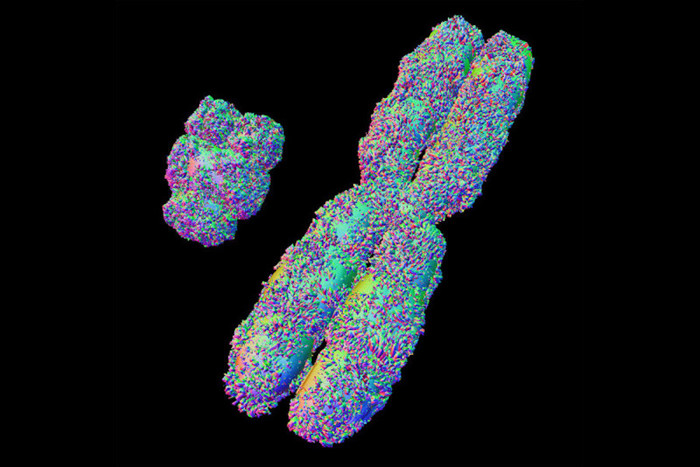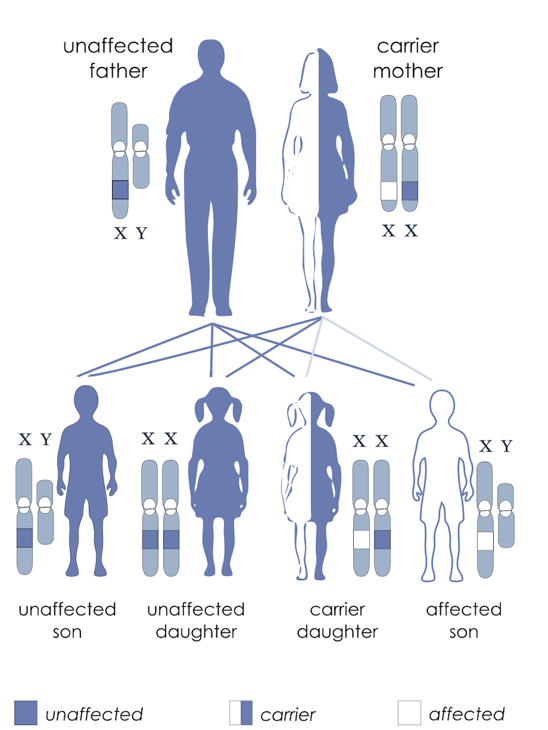
Could I be a carrier of muscular dystrophy through my father’s side of the family?
July 17, 2013

- Related Topics:
- Genetic conditions,
- Medical genetics,
- Muscular dystrophy,
- Carrier,
- X linked inheritance,
- X inactivation
An undergraduate from Tennessee asks:
"Hello! I have a question pertaining to muscular dystrophy. My father’s mother (my paternal grandmother) had two brothers with muscular dystrophy, who both died in their teens. My grandmother had three children, none of whom had MD.
Thanks for your question, although it isn't an easy one to answer. Muscular dystrophy (MD) is complicated. It's actually several different muscle diseases with one name. Some of these diseases can be passed down from your parents, and some can be caused by the environment.
Since two of your paternal grandmother's brothers had MD, they probably had a type that is inherited. We can also make an educated guess about what kind of MD they had because they both died in their teens. Most likely, they had the most common form of MD, Duchenne muscular dystrophy (DMD).
If they did have DMD, then the odds are very small that you inherited it. This is because only women can usually carry dormant versions of DMD. Men either have the full blown disease, or there is no hint of it in their DNA.
So, if your dad got the version of a gene that causes DMD from his mom, then he’d have the disease. Since he doesn’t, he can’t pass DMD down to you.

Of course, all of this depends on your family having DMD in its history, which might not be the case. There are several other kinds of MD that run in families that can be inherited from a mom or a dad that don’t have symptoms.
However, these types normally don’t cause death at a young age and are a lot rarer. Also, you usually have to inherit the DNA that leads to these forms of MD from both parents. This doesn’t sound like your family’s situation, but it is theoretically possible.
If one of these rare and unlikely scenarios is what is going on in your family, then you could be a carrier. But for your children to have a high risk (1 in 4) of getting one of these forms of MD, your spouse would have to be a carrier too. If there is no history of MD in his family, then the odds are pretty slim he would be a carrier.
I told you this was a tough one to answer! So, to recap, if you have a family history of DMD, you don’t have any more worries than anyone else in the world. You are very unlikely to be a carrier of DMD.
If you have a family history of a different type of MD, then there is a chance you are a carrier. But, for your kids to be at risk for this MD, your spouse would have to be a carrier of that particular form of MD too. Not very likely at all, but possible.
But as I have said, your uncles probably had DMD, which means you did not inherit their DMD from your father. It isn’t 100% certain, but it is way more likely than the other possibilities.
So, for the rest of the answer, I’ll dig a little deeper into why you are so unlikely to carry DMD in your genes. As you’ll see, it has to do with the X chromosome.
X Marks the Spot
In humans, as well as all other non-bacterial life, DNA is packaged into chromosomes. Chromosomes are basically big pieces of DNA that can be compressed and easily moved around by cells when they divide. Most people have two sets of 23 different chromosomes, each set inherited from one parent, for a total of 46.
Each chromosome in 22 of the pairs is very similar to the other. The two chromosomes in each pair pretty much have all the same genes. The exception to this is the 23rd pair, the sex chromosomes.
The chromosomes you have in the 23rd pair pretty much decide whether you’ll be a boy or a girl. If you have two X chromosomes, you’re usually a girl and if you have an X and a Y, you’re usually a boy.
The X and the Y are two very different chromosomes. The Y chromosome is much smaller than the X and has a very different set of genes (most of them deal with male development). And this can cause some real problems for men.

When people have children, they both pass on one of each of their pairs of chromosomes to their child. Females always give an X chromosome, but males can give an X or a Y (this is why the dad determines the sex of the child). So if you are a boy, you must have got your Y from your dad and your X from your mom.
This all matters for our discussion of DMD because it is caused by a DNA glitch in a gene called dystrophin on the X chromosome.
To end up with DMD, all your copies of the dystrophin gene have to have the glitch. For men, this means that just one copy of a damaged dystrophin gene can lead to DMD. But it is different for women.
Because they have two X chromosomes, women can have one working copy of the dystrophin gene and one broken copy. These women do not have DMD because they have a working copy of the gene. They are called carriers.
Unfortunately, though, these women can still pass the bad copy down to their kids. And if that child is male, then he will get DMD if he gets the X chromosome with the glitch in the dystrophin gene. The boy does not have a backup copy on another X chromosome to cover up the broken gene.
This may have happened in your family. Your father’s grandmother could have had an X that was fine and one with a glitch in the dystrophin gene. She could have been a carrier for DMD.
For our story here however, it doesn’t matter if she got the X with the glitch or not. Since your dad didn’t have DMD, we know he got an X that doesn’t lead to the disease. If he got one that did, he would have DMD simply because he is a guy!

Your dad has just one X to pass to you and it is one that doesn’t lead to DMD. So, you are almost certainly not a carrier for DMD.
This kind of inheritance is called X-linked recessive. The recessive refers to the fact that the working copy wins out over the broken one (the working copy is called dominant). The X-linked part just refers to the fact that the gene is on the X chromosome.
Lots of other diseases and conditions are X-linked too. Colorblindness and hemophilia are two famous ones, although there are lots of others too.
So, if DMD runs in your family, you almost surely are not a carrier because your dad doesn’t have DMD. He has only a normal X to pass to his daughters.
Of course, again, keep in mind that this explains the situation if the form of MD in your family is DMD. If it is some other form then you might be a carrier. But that isn’t as likely and besides, for your kids to be at a significant risk, your spouse would have to be a carrier of that rare form of MD too.
Read More:
- Muscular Dystrophy Association: More about Duchenne Muscular Dystrophy
- Why do half of women who carry the DMD gene not have the disease?
- X inactivation

Author: Ryan Bell
When this answer was published in 2013, Ryan was a Ph.D. candidate in the Department of Genetics, working in Andy Fire's laboratory. He wrote this answer while participating in the Stanford at The Tech program.
 Skip Navigation
Skip Navigation
